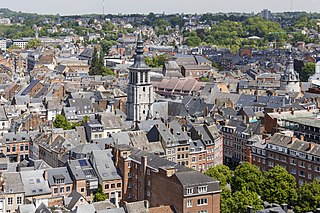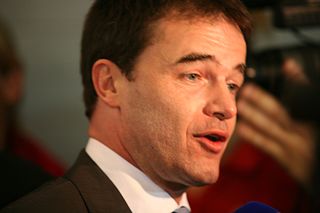
Belgium,officially the Kingdom of Belgium,is a country in Northwestern Europe. The country is bordered by the Netherlands to the north,Germany to the east,Luxembourg to the southeast,France to the south,and the North Sea to the west. It covers an area of 30,689 km2 (11,849 sq mi) and has a population of more than 11.7 million. With 383/km2 (990/sq mi),Belgium's population density ranks 22nd in the world and 6th in Europe. Belgium is part of an area known as the Low Countries,historically a somewhat larger region than the Benelux group of states,as it also included parts of northern France. The capital and largest metropolitan region is Brussels;other major cities are Antwerp,Ghent,Charleroi,Liège,Bruges,Namur,and Leuven.

Wallonia,officially the Walloon Region,is one of the three regions of Belgium—along with Flanders and Brussels. Covering the southern portion of the country,Wallonia is primarily French-speaking. It accounts for 55% of Belgium's territory,but only a third of its population. The Walloon Region and the French Community of Belgium,which is the political entity responsible for matters related mainly to culture and education,are independent concepts,because the French Community of Belgium encompasses both Wallonia and the bilingual Brussels-Capital Region but not the German-speaking Community of Belgium.

Namur is a city and municipality in Wallonia,Belgium. It is the capital both of the province of Namur and of Wallonia,hosting the Parliament of Wallonia,the Government of Wallonia and its administration.

The Reformist Movement is a liberal French-speaking political party in Belgium,which includes social-liberal and conservative-liberal factions. Stemming from the Belgian Liberal Party founded in 1846,the MR is one of the oldest parties on the European continent.
The National Democracy is a francophone Belgian far-right political party. The party advocated a strong unitary Belgian nationalism,strongly opposed immigration,and reached out to Flemish voters.

Elio Di Rupo is a Belgian politician who has served as the minister-president of Wallonia since 2019. He is affiliated with the Socialist Party. Di Rupo previously served as the prime minister of Belgium from 6 December 2011 to 11 October 2014,heading the Di Rupo Government. He was the first francophone to hold the office since Paul Vanden Boeynants in 1979,and the country's first socialist prime minister since Edmond Leburton left office in 1974. Di Rupo was also Belgium's first prime minister of non-Belgian descent,and the world's second openly gay person and first openly gay man to be head of government in modern times.
Walloon is a Romance language that is spoken in much of Wallonia and,to a very small extent,in Brussels,Belgium;some villages near Givet,northern France;and a clutch of communities in northeastern Wisconsin,United States.

The Parliament of Wallonia,or the Walloon Parliament in the decrees,is the legislative body of Wallonia,one of the three self-governing regions of Belgium. The parliament building,the former Hospice Saint-Gilles,is situated in Namur,the capital of Wallonia,at the symbolic confluence of the Meuse and the Sambre,the two main rivers of the most inhabited parts of Wallonia,the Sillon industriel. On the other side of the Meuse,facing the Parliament,is the Élysette,the seat of the Government of Wallonia.

In Belgium,the French Community refers to one of the three constituent constitutional linguistic communities. Since 2011,the French Community has used the name Wallonia-Brussels Federation,which is controversial because its name in the Belgian Constitution has not changed and because it is seen as a political statement. The name "French Community" refers to Francophone Belgians,and not to French people residing in Belgium. As such,the French Community of Belgium is sometimes rendered in English as "the French-speaking Community of Belgium" for clarity,in analogy to the German-speaking Community of Belgium.

The Flemish Region,usually simply referred to as Flanders,is one of the three regions of Belgium—alongside the Walloon Region and the Brussels-Capital Region. Covering the northern portion of the country,the Flemish Region is primarily Dutch-speaking. With an area of 13,626 km2 (5,261 sq mi),it accounts for only 45% of Belgium's territory,but 58% of its population. It is one of the most densely populated regions of Europe with around 500/km2 (1,300/sq mi).

The Workers' Party of Belgium is a Marxist and socialist political party in Belgium. It is the only Belgian party represented in parliament that is a fully national party,representing both Flanders and Wallonia. Having historically been a small party,the PTB-PVDA has gained momentum since the 2010s,continuously scoring better at the elections,particularly in Wallonia and working-class communities in Brussels.

"The Song of the Walloons" is the regional anthem of Wallonia in Belgium. The original lyrics were written by Théophile Bovy in 1900 in the Walloon language. A year later,it was set to music composed by Louis Hillier. Performed for the first time in the city of Liège,the song quickly spread to other parts of French-speaking Belgium and established itself like a "national" anthem for Wallonia.

The European Democratic Party,also known as the European Democrats,is a centrist European political party in favour of European integration.

Elections in Belgium are organised for legislative bodies only,and not for executive functions. Direct elections take place for the European Parliament,the Chamber of Representatives,the Parliaments of the Regions,the Parliaments of the Communities,the provincial councils,the municipal councils and the councils of Districts of Antwerp. Voting is mandatory in federal elections,and all elections use proportional representation which in general requires coalition governments.

The Walloon Government or Government of Wallonia is the executive branch of Wallonia,and it is part of one of the six main governments of Belgium. It sits in Namur,where the Parliament of Wallonia is seated as well.

Benoît Lutgen is a Belgian politician who served as head of the Centre démocrate humaniste political party in Belgium from 2011 to 2019.

Willy Borsus is a Belgian politician. He is a member of the Reformist Movement (MR). He was the 14th Minister-President of Wallonia from the 28th of July 2017 to the 13th of September 2019.
Damien Yzerbyt was a Belgian politician (cdH) and a member of the Parliament of Wallonia.

Hainaut is one of the 11 multi-member constituencies of the Chamber of Representatives,the lower house of the Belgian Federal Parliament,the national legislature of Belgium. The constituency was established in 2003 following the re-organisation of constituencies across Belgium along provincial lines. It is conterminous with the province of Hainaut. The constituency currently elects 18 of the 150 members of the Chamber of Representatives using the open party-list proportional representation electoral system. At the 2019 federal election the constituency had 942,789 registered electors.
HervéCornillie is a Belgian politician of the Reformist Movement serving as a member of the Chamber of Representatives since 2024. From 2019 to 2022,he was a member of the Parliament of Wallonia.















